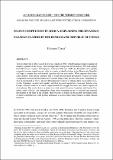Status competition in Africa : explaining the Rwandan-Ugandan clashes in the Democratic Republic of Congo
Abstract
Yoweri Museveni’s rebels seized power in Uganda in 1986, with Rwandan refugees making up roughly a quarter of his troops. These refugees then took power in Rwanda in 1994 with support from Museveni’s regime. Subsequently, between 1999 and 2000, the Rwandan and Ugandan comrades-in-arms turned on each other in a series of deadly clashes in the Democratic Republic of Congo, a country they had invaded together only one year earlier. What explains these fratricidal clashes? This article contends that a social–psychological perspective focused on status competition between the Rwandan and Ugandan ruling elites provides the most compelling answer. Long treated as ‘boys’, the new Rwandan rulers strove to enhance their social status vis-à-vis the Ugandans, seeking first equality and then regional superiority. Economic disputes over Congo’s natural resources at times complemented this struggle for status but cannot explain all of its phases. The article draws on interviews with senior Rwandan, Ugandan, and former Congolese rebel officials, and triangulates them with statements given to national and regional newspapers at the time of the clashes. More broadly, it builds on the recently revitalized study of status competition in world politics and makes a case for integrating research on inter-African relations.
Citation
Tamm , H 2019 , ' Status competition in Africa : explaining the Rwandan-Ugandan clashes in the Democratic Republic of Congo ' , African Affairs , vol. 118 , no. 472 , pp. 509–530 . https://doi.org/10.1093/afraf/ady057
Publication
African Affairs
Status
Peer reviewed
ISSN
0001-9909Type
Journal article
Description
The interviews for this article were completed while the author was a Postdoctoral Prize Research Fellow at Nuffield College, University of Oxford. The author gratefully acknowledges travel grants from the Cyril Foster Fund and the Alastair Buchan Subsidiary Fund of the Department of Politics and International Relations, the Peter Fitzpatrick Fund of St Antony’s College, and the John Fell OUP Research Fund, all at the University of Oxford.Collections
Items in the St Andrews Research Repository are protected by copyright, with all rights reserved, unless otherwise indicated.

